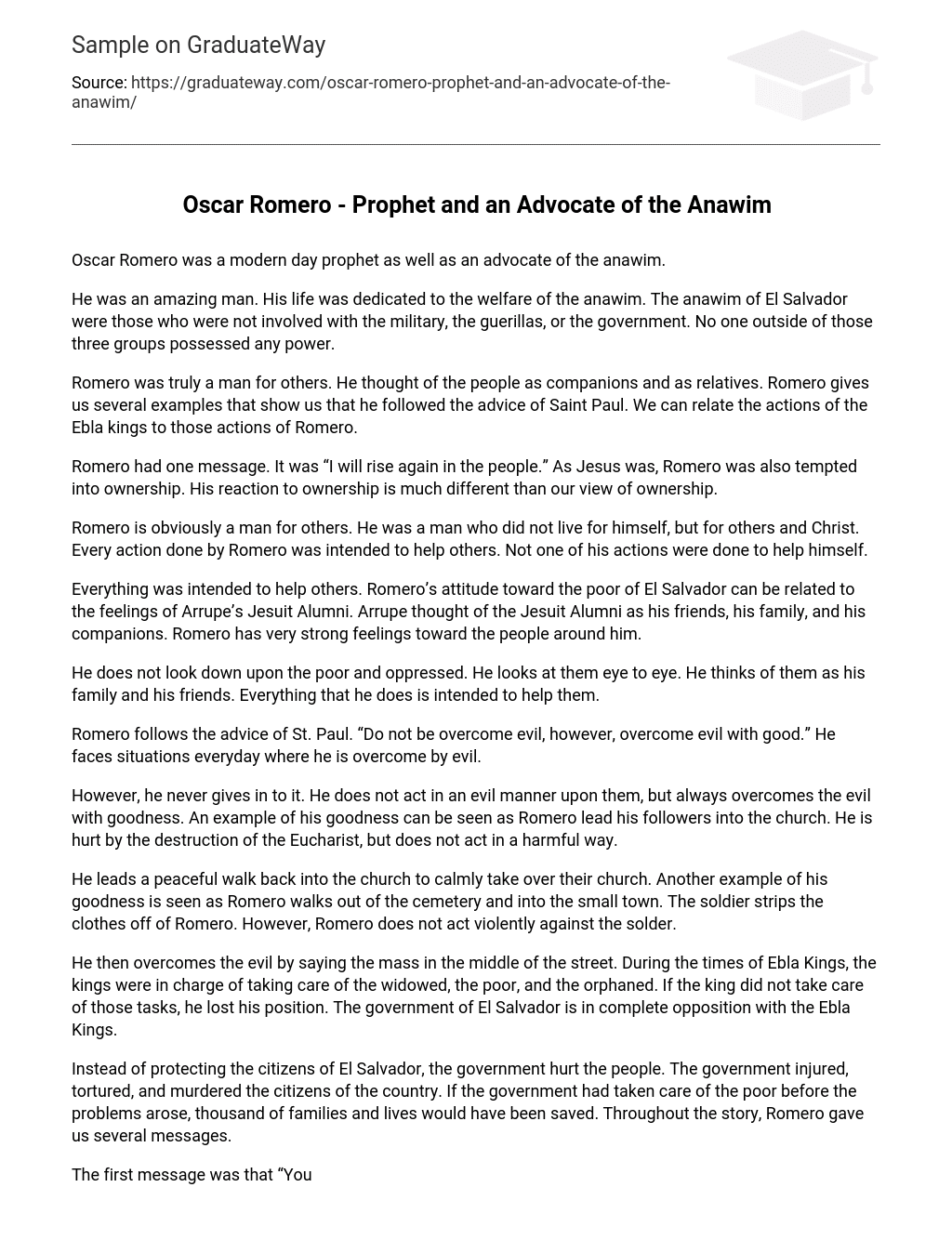Oscar Romero was a supporter of the anawim and also considered a contemporary prophet.
He was an incredible man who devoted his life to the well-being of the anawim – those in El Salvador who had no affiliations with the military, guerrillas, or government and thus lacked any form of authority.
Romero exemplified a genuine altruistic nature, considering the wellbeing of others as he regarded them as companions and family. His actions mirrored the teachings of Saint Paul, and in particular, the actions of the Ebla kings can be compared to those of Romero.
Romero’s singular message was “I will rise again in the people,” contrasting his response to ownership with our conventional perspective. Like Jesus, Romero faced temptation regarding ownership, but his reaction diverged significantly.
Romero exemplified selflessness as a man devoted to others and Christ. Every act he performed was solely to aid others, and none were for his own benefit.
Everything was meant to assist others. Romero’s stance towards the impoverished in El Salvador can be connected with the sentiments held by Arrupe’s Jesuit Alumni. Arrupe considered the Jesuit Alumni to be his friends, his family, and his companions. Romero possesses intense emotions towards those in his vicinity.
Contrary to having a condescending attitude towards the poor and oppressed, he treats them with equality and respect, considering them as part of his family and circle of friends. He continuously strives to assist them in any way he can.
Romero follows St. Paul’s advice of not giving in to evil, but rather overcoming it with goodness. Every day, he confronts situations that overwhelm him with wickedness.
Nevertheless, he never succumbs to it. Instead of responding with malevolence, he consistently triumphs over it with acts of benevolence. An illustration of his benevolence is displayed when Romero guides his followers to the church. Although he is pained by the desecration of the Eucharist, he refrains from retaliating with harm.
He peacefully leads a walk back into the church to peacefully take over their church. Another example of his goodness is witnessed as Romero walks out of the cemetery and into the small town. The soldier proceeds to strip Romero’s clothes off. Nevertheless, Romero refrains from responding violently to the soldier.
In the midst of the street, he triumphs over evil by performing the mass. In the era of Ebla Kings, it was their responsibility to provide for the widowed, the poor, and the orphaned. Neglecting these duties would result in losing their positions. The government of El Salvador starkly contrasts the principles of the Ebla Kings.
The government of El Salvador caused harm to its citizens by failing to provide protection. This harm included physical and psychological suffering, as well as death. If poverty issues had been addressed sooner, many families and lives could have been saved. Romero’s story communicated various messages.
Two significant messages were conveyed. The first message proclaimed, “You are Jesus Christ.” The second message revealed the promise of resurrection within the people. These two messages provided immense guidance and support to the individuals. Both Jesus and Romero faced temptation.
Romero received a multitude of gifts when he assumed the role of Archbishop, including extravagant luxuries. Despite the lavish offerings, he only accepted and appreciated those gifts that were essential for daily living.
In the movie, the protagonist finds pleasure in receiving and using a new pair of black shoes as it serves as a necessary item for everyday life. Moreover, the Catholics in the narrative demonstrate a profound connection with God and Jesus, perceiving their presence in various aspects of their daily existence.
Despite the lack of possessions and living conditions in shacks, a significant number of people in El Salvador maintain a deep sense of devotion to their savior. Their religion serves as their sole possession, highlighting its importance. Personally, I regard Romero as an exceptional individual.
Despite facing immense pain and hardship, he remained an incredibly strong man who found the courage to confront his friends’ murderers. Personally, I lack the bravery and strength that he possessed and I doubt my ability to have accomplished what he did.
I cannot fully commit myself to others and lack the ability to follow St. Paul’s counsel due to my selfish nature.
I believe in fighting evil with evil, not with goodness. Romero doesn’t come across as a distant and unfamiliar historical figure. There are numerous individuals in the present day who lead lives akin to Romero’s. We can connect Romero to the influential figure within our community at St.
Peter’s father, Father Azzarto, can be compared to Romero in terms of dedicating his life to helping others, although Azzarto’s impact is on a lesser scale.
Whether he is a student at St. Peter’s or residing in a small Nigerian village in Africa, he is undoubtedly a true man for others. Romero has likely been a guiding inspiration for numerous activists since 1980.
Only a small number of individuals in the world possess the same strength and love that Father Romero had.





